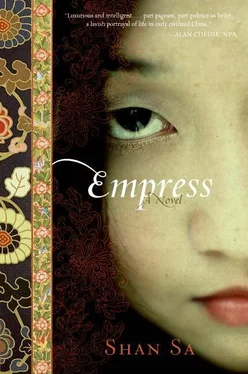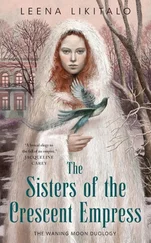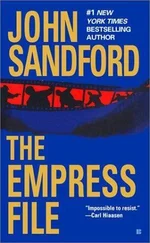Shan Sa - Empress
Здесь есть возможность читать онлайн «Shan Sa - Empress» весь текст электронной книги совершенно бесплатно (целиком полную версию без сокращений). В некоторых случаях можно слушать аудио, скачать через торрент в формате fb2 и присутствует краткое содержание. Жанр: Историческая проза, на английском языке. Описание произведения, (предисловие) а так же отзывы посетителей доступны на портале библиотеки ЛибКат.
- Название:Empress
- Автор:
- Жанр:
- Год:неизвестен
- ISBN:нет данных
- Рейтинг книги:5 / 5. Голосов: 1
-
Избранное:Добавить в избранное
- Отзывы:
-
Ваша оценка:
- 100
- 1
- 2
- 3
- 4
- 5
Empress: краткое содержание, описание и аннотация
Предлагаем к чтению аннотацию, описание, краткое содержание или предисловие (зависит от того, что написал сам автор книги «Empress»). Если вы не нашли необходимую информацию о книге — напишите в комментариях, мы постараемся отыскать её.
Empress — читать онлайн бесплатно полную книгу (весь текст) целиком
Ниже представлен текст книги, разбитый по страницам. Система сохранения места последней прочитанной страницы, позволяет с удобством читать онлайн бесплатно книгу «Empress», без необходимости каждый раз заново искать на чём Вы остановились. Поставьте закладку, и сможете в любой момент перейти на страницу, на которой закончили чтение.
Интервал:
Закладка:
A great emptiness had been carved out in my soul; I watched all the effervescence of the world with a derisive smile. I still had the warmth of life within me, though, and enthusiasm for the future. There was still the Tang dynasty and its vast provinces. The millions of souls in the Empire had become a huge family in which I was the embodiment of an energetic and authoritarian mother. I was over forty, and I held in my hand an invisible sword that sliced through every illusion. The sharpness of the blade gave me its icy and dazzling strength. I no longer believed in the compassion of men; I believed in that of the gods. I had averted my eyes from my suffering and fixed them on the stars.
SEVEN
The Emperor Lordly Forebear had brandished his sword and conquered the Chinese lands with arms. When the Emperor Eternal Ancestor had risen to the throne, he had healed the wounds of a ravaged country. Thirty years after it was founded, our Tang dynasty had all the fragile grandeur of a convalescing empire. In our hands it would see unprecedented prosperity or fall back into poverty. It would be a unified power or would splinter into kingdoms.
Our august predecessor had been chiefly preoccupied with agrarian developments, and, like him, we continued to lower land taxes. Weaving factories proliferated along the banks of both great rivers. To encourage households all over China, I set an example by rearing silk worms in the imperial parks. While the sovereign personally took part in more and more ritual ceremonies for the cultivation of the land, I conducted the meticulous celebrations for harvesting mulberry leaves so that the Goddess of Weavers would give us her blessing.
Caravans came from the west in search of porcelain and silk, breathing new life into our civilization. Our women, tired of being swaddled in several layers of dresses with long sleeves, now chose tunics with narrow sleeves, wide trousers, and leather boots that freed their feet from the constraints of rigid shoes with curled toes. The dizzying height of our traditional headdresses required hours of work, and they were so heavy that they impaired our movements. The desert women wore their hair simply dressed, crowned with light felt hats; by imitating them, we could walk or run as fast as men.
The craze for exotic spices and foreign foods kept expanding. Furniture from western kingdoms streamed into China, piled on camels’ backs. High-level chairs and tables and raised beds allowed us to stretch our legs and brought beneficial comforts to our everyday lives. Our ancestral arts favored restraint, purity, and metaphysical abstraction, but this quest for a spiritual essence denied the warmth of the senses and the whims of the heart. The music from the oasis conquered us with its powerful impulsive rhythms and immodest palpitations. The twirling dances from those parts-so different from the Chinese dances that included restricted and graceful slowness and ritual gestures-showed us all the beauty of spontaneity and reconciled for us the sensuous pleasures that our sages had neglected for so long.
Imperial patrols guaranteed the safety of the Silk Road through the Gobi desert. Inside the Great Wall, new inns had been built to make the journey easier for travelers. In Long Peace I opened academies to provide a forum for foreign scholars and Chinese tutors to pass on their knowledge, train interpreters, and compile dictionaries in every language.
Officials complained about the growing number of temples dedicated to unknown idols, but I ignored these pointless concerns. Buddha was a god who had been revealed to the West, and the spread of the Buddhist faith had never eclipsed the glory of the deities we had venerated since the dawn of time. Every religion was a blade that allowed its faithful to carve up the lie that is life. I encouraged my people to choose the tool that suited them best.
In my eyes, a country’s enthusiasm for other customs was the mark of a great civilization that could absorb every difference. This new wealth and the abundance of our own ancient heritage had transformed China into a stellar empire that shone beyond its own borders. Distant kingdoms dreamed of Long Peace as a city destined to be happy and prosperous. Our history, which had been related through the dynasties by Court chroniclers, was a generous source from which men could draw ideas and reflections. Our criteria for elegance became the universal points of reference for good taste. Western kings and far-eastern princes sent their scholars to our Court to study politics, justice, administration, military organization, medicine, literature, the arts, and architecture. Numerous foreign capitals took their inspiration from the example set by Long Peace, and their imperial palaces were smaller copies of ours. Chinese was the most widespread language in the world, and it became the official language of diplomacy with which every kingdom could communicate. The morals and ethics of Confucius were adopted by many countries and served as a code of behavior and an official doctrine.
Inside the Great Wall, I encouraged trade between the towns of the Yellow River and the River Long. I constantly created new routes to stimulate exchanges between different regions. Nevertheless, the rivers remained my own preferred means of transport. Forty years later, I still could not forget the huge sailing boats laden with mountains of goods. Every year I opened a new canal to provide irrigation for the fields and a link between the rivers.
Long Peace, the greatest trading town under heaven, prospered. Luoyang, Yangzhou, and Jinzhou became commercial crossroads where commoner clans accrued new fortunes. Since the dawn of time, merchants had occupied the lowest rung on the social ladder. Previous Courts had treated them as thieves, but I recognized their active participation in the country’s prosperity: Their greed spurred on an increase in expertise and furthered productivity among farmers and craftsmen; their speculations guaranteed closer links between the north and the south and the towns and the country. Their dynamic outlook contrasted with the weighty aristocracy with their Great Names and their autocratic way of life that was now hampering the Empire’s development.
These old families were major landowners and had reached their peak during the Wei and Jin dynasties. Within their fortified farms, which were like completely independent kingdoms, they intermarried and defied central authority by refusing any interference from the outside world. When our Tang dynasty was founded and the Emperor Lordly Forebear distributed noble titles to his comrades in arms, this gesture was frowned on. When the Emperor Eternal Ancestor published his Book of Clans in which he put the imperial family before the Great Names, he too was jeered at. As the daughter of an ennobled merchant, I would never forget how the old aristocracy had treated me with contempt. More than any previous sovereign, I wanted to dismantle an outdated world and its obsolete hierarchy.
An imperial decree forbade a dozen of the key families from arranging marriages with one another. Two ministers who had been born commoners were given the responsibility of establishing a new social order. They wrote the Book of Names, which was accepted as an authority so that the new titles given out by the sovereign came before the old nobility.
Ever since ancient times, the Court had recruited its highest officials from the Empire’s aristocratic clans, and their duties had been handed down from father to son. Politics was a matter of inheritance, something that was constantly redistributed among the privileged. Matrimonial alliances reinforced the influence of ambitious households that held sway over sovereigns. Emperor Yang of the previous dynasty had invented a system of recruitment by public competition that allowed scholars to earn state responsibilities and the title of mandarin. But until now this method of selection had been restricted to the appointment of minor officials whose careers would always be limited because of their origins.
Читать дальшеИнтервал:
Закладка:
Похожие книги на «Empress»
Представляем Вашему вниманию похожие книги на «Empress» списком для выбора. Мы отобрали схожую по названию и смыслу литературу в надежде предоставить читателям больше вариантов отыскать новые, интересные, ещё непрочитанные произведения.
Обсуждение, отзывы о книге «Empress» и просто собственные мнения читателей. Оставьте ваши комментарии, напишите, что Вы думаете о произведении, его смысле или главных героях. Укажите что конкретно понравилось, а что нет, и почему Вы так считаете.





